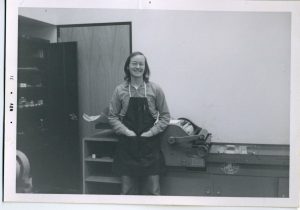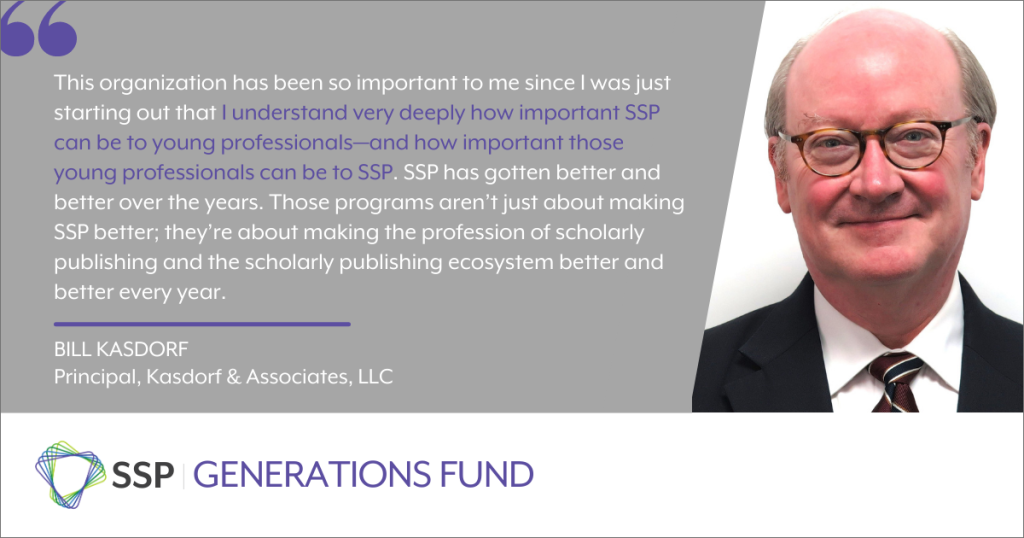Bill Kasdorf is a long-time member of SSP and has supported the Generations Fund with multiple donations. We interviewed him to learn more about his membership story and motivation for supporting the next generation of scholarly communications professionals.
Can you tell me how you became involved in scholarly communications? When and how?
 After college and two years in a CO (Conscientious Objector) job during the Vietnam War years, I took over a former roommate’s place as a proofreader for a very small publisher of historical musicology. I think I was one of three employees at the time. I didn’t read music, which made me a really good proofreader; a more knowledgeable person sees what they know is on the page rather than what’s actually there. I gradually became involved in every aspect of the place, as a designer, as a copyeditor, as a manager of a growing staff, and especially in implementing technology to make the work more efficient. This started with a word processing machine as big as a washing machine and one of the first digital typesetting machines.
After college and two years in a CO (Conscientious Objector) job during the Vietnam War years, I took over a former roommate’s place as a proofreader for a very small publisher of historical musicology. I think I was one of three employees at the time. I didn’t read music, which made me a really good proofreader; a more knowledgeable person sees what they know is on the page rather than what’s actually there. I gradually became involved in every aspect of the place, as a designer, as a copyeditor, as a manager of a growing staff, and especially in implementing technology to make the work more efficient. This started with a word processing machine as big as a washing machine and one of the first digital typesetting machines.
When asked for a fact about me that people wouldn’t guess, I always mention that I am the designer of a significant portion of what was originally the Mergenthaler music font. At the time, they only had the basics for simple modern notation; we needed all the bells and whistles for historical musicology. Its descendants are still used today. And I became really interested in markup. Later, we branched out into providing design, editing, and typesetting services for others; our concentration was university presses.
Tell us a little bit about your work now.
I’m a publishing technology consultant. My focus is on editorial and production workflows, content modeling, standards, and best practices, and accessibility. In the over four decades between that start as a proofreader and my current work, I’ve had my own publishing services firm, served as a vice president for a major book manufacturer, served as a vice president for a leading prepress and data conversion firm, and had a whole lot of fun along the way. The most fun of all is what I do today. And I participate in a lot of standards bodies—the W3C, NISO, BISG, IPTC, the DAISY Consortium. I’m a big advocate for standards.
How did you first get involved with SSP?
In that first job back in the 1970s, I heard about a new society that had just recently started up: the Society for Scholarly Publishing. I attended the second SSP Annual Meeting and have been involved in SSP ever since through all those roles and jobs I just mentioned. SSP has been hands-down the most important thing in my professional life. I heard a talk at an early SSP Annual Meeting by Charles Goldfarb from IBM, who had just developed, with two colleagues, a “Generalized Markup Language,” GML, which became SGML, which became XML and HTML.
I have been advocating and educating about standardized markup all these years. I first heard about the internet at SSP when it was called the “Information Superhighway.” I first heard about Wikipedia at SSP. I could cite so many things I first learned about at SSP. And over the years, I met so many wonderful people through SSP as well.
Why did you decide to support SSP’s Generations Fund? Why is it important to support the next generation of scholarly communications professionals through SSP’s Fellowship, Mentoring, and DEIA programs?
This organization has been so important to me since I was just starting out that I understand very deeply how important SSP can be to young professionals—and how important those young professionals can be to SSP. SSP has gotten better and better over the years. Those programs—which to an old timer like me qualify as new—aren’t just about making SSP better; they’re about making the profession of scholarly publishing and the scholarly publishing ecosystem better and better every year.
What would you tell someone who was thinking about making a gift to the Generations Fund?
Do it! Every contribution, no matter how small, makes a difference. We all need to contribute to making SSP, and scholarly publishing, the best they can be. And getting young professionals involved is a good way to do that. One of the best things about SSP is how it has evolved over the years rather than being stuck in the past.
Join Bill with your gift today to the Generations Fund!


